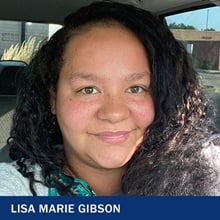For Jazzmen Shipp, Earning a Degree Changed Everything
Business | 2min Read

A Bachelor of Arts (BA) in Human Services from Southern New Hampshire University is the perfect way to put your compassion to work. The program will teach you how to combine policy knowledge with the art of advocacy, so you can help improve the lives of individuals, families or entire populations.
Each class is built to give you the confidence and knowledge needed to become a human services professional. At the program's end, you'll be required to complete a capstone experience that demonstrates how your new skills can be applied in a real-world setting.
Focus on a general track or add a specialization to your bachelor’s degree with one of three concentrations.
Learn to advocate for change on behalf of children and families in the online Bachelor of Arts (BA) in Human Services program with a concentration in Child and Family Services. You'll explore how social issues affect the well-being of families and their communities. You'll also analyze how federal and state policies impact services.
Your online bachelor's in human services can prepare you to provide case management services, such as assessment, relationship building, collaborative development and evaluation of treatment plans, and the referral of clients to necessary community service providers.
This concentration is designed for those with a particular interest in child welfare, schools, juvenile corrections, family court, family support agencies and domestic violence agencies. Ideal candidates will work well with at-risk clients, collaborate comfortably with a multi-disciplinary team, maintain good written and oral communication skills, and respect a rigid code of ethics.
Child development is a key focus, as is the impact of stress and trauma, public policy and the court system. Proficiency in these areas will help you develop intervention strategies. Ultimately, your ability to ethically and effectively link families with much-needed community resources will improve the well-being of families and entire communities.
Career outlook:
According to the U.S. Bureau of Labor Statistics, the demand for social and community service managers is projected to increase by 9% through 2032, much faster than the average for all occupations.1 Whether you're interested in working in prevention, intervention or advocacy, there are plenty of roles in the field of child and family services, including:
The bachelor's in human services requires the completion of a capstone experience. The capstone will challenge you to demonstrate how your new skills can be applied in a real-world setting.
Courses may include:
If you’re ready for a career with both purpose and promise, you might consider specializing in gerontology. By earning your Bachelor of Arts (BA) in Human Services with a concentration in Gerontology, you'll gain the knowledge needed to embrace a career in human services and meet an increased need for professionals serving the baby boomer generation and beyond.
As the population grows, so does the number of people who need aging services. Baby boomers will continue to place added demands on these programs, increasing the need for workers seeking gerontology careers. And with medical advancements, we’ll see this trend continue. The U.S. Census Bureau reports that by 2034, the number of people age 65 and older will be greater than the number of children under 18.2
Our gerontology concentration has been designed to meet the challenge of caring for the nation’s aging population over the coming decades. Your instructors will teach you how to develop strategies that enhance programs for the elderly and improve care.
With a gerontology concentration, you'll develop new perspectives that allow you to improve the quality of life for an increasingly important segment of our population. You'll take courses that offer a firsthand look into:
Career outlook:
If you're looking to position yourself for a career with great job security, specializing your degree with the gerontology concentration is a smart choice. The U.S. Bureau of Labor Statistics projects the need for social and community service managers will increase by 9% through 2032, much faster than the average for all occupations.1
Upon graduating, you might look for employment in places like:
Courses may include:
Act as support for those overcoming addiction with a Bachelor of Arts (BA) in Human Services with a Substance Abuse Concentration. Substance use disorder is top-of-mind in the United States, making treatment services – and workers – in high demand. The online substance abuse concentration serves as an important first step toward becoming a drug and alcohol counselor.
Note: The licensure process and educational requirements for drug and alcohol counselors vary from state to state. This program does not directly lead to licensure.
Career outlook:
According to the U.S. Bureau of Labor Statistics, jobs for substance abuse, behavioral disorder and mental health counselors are projected to grow 18% from 2022 to 2032, much faster than the national average for all occupations.1
Courses may include:
As a NAADAC Approved Education Provider, Southern New Hampshire University offers courses that you can apply toward the continuing education (CE) requirements for voluntary national credentialing by the National Certification Commission for Addiction Professionals (NCC AP). This means that while you work toward your degree, you could also earn CE contact hours toward an NCC AP certification. Learn more about this continuing education opportunity.
Client assessment, outcome evaluation, policy change advocacy, care plan development — you name it, these classes will cover it.
All undergraduate students are required to take general education courses, which are part of SNHU's newly redesigned program, The Commons. The goal of The Commons' curriculum is to empower you with some of the most in-demand skills, so you can succeed not only in your academic career, but in your personal and professional life too.
Minimum Specifications:
Additional Information:
SNHU has provided additional information for programs that educationally prepare students for professional licensure or certification. Learn more about what that means for your program on our licensure and certification disclosure page.
Our no-commitment application can help you decide if SNHU is the right college for you and your career goals. Apply up until 2 days before the term starts!
Upcoming term starts: May 4, 2026 | June 29, 2026
Attending college online at SNHU can be a life-changing experience. In fact, 93.4% of online students would recommend SNHU according to a 2025 survey with 8,718 respondents.
Our faculty carry with them decades of experience in human services. By bringing real-world insights to the classroom, they can help position graduates for success in this vital field.

Rhonda N. Hughes' career as a social worker began more than three decades ago. With advanced training spanning from psychological trauma to interpersonal neurobiology, she's served individuals, children and families in a variety of community-based inpatient and outpatient settings. Currently, Hughes works in private clinical practice as a mental health therapist and supports a county Head Start program with mental health consultation.
Position
Adjunct Faculty and Academic Partner
Joined SNHU
2003
Education
Read more about Rhonda N. Hughes and other online faculty at SNHU.
You’ll take your courses within SNHU’s Brightspace platform. This is where you’ll find your:

At Southern New Hampshire University, you'll have access to a powerful network of more than 400,000 students, alumni and staff that can help support you long after graduation. Our instructors offer relevant, real-world expertise to help you understand and navigate the field. Plus, with our growing, nationwide alumni network, you'll have the potential to tap into a number of internship and career opportunities.
Recently, SNHU has been nationally recognized for leading the way toward more innovative, affordable and achievable education:
Founded in 1932, Southern New Hampshire University is a private, nonprofit institution with over 250,000 graduates across the country. SNHU is accredited by the regional accreditor New England Commission of Higher Education (NECHE), which advocates for institutional improvement and public assurance of quality.
No application fee. No test scores. And no college essay. Just a simple form with basic information. It’s another way SNHU helps you reach your goals sooner.
It's easy, fast and free.
Whether you're applying for an undergraduate or graduate degree, you’ll fill out a form to verify your previous education experience. As part of our admissions process, we'll help you request transcripts from your previous school(s) to see if you can transfer any credits into your SNHU program! (Also for free!)
After reviewing your official evaluation, you can decide if SNHU is right for you! If you choose to enroll, just pick your start date and get ready for classes to begin.
Talk to an admission counselor: 888.327.SNHU | enroll@snhu.edu
SNHU is accredited by the regional accreditor the New England Commission of Higher Education (NECHE). The university also carries specialized accreditations for some programs.

As a nonprofit university, SNHU offers some of the lowest online tuition rates in the country. And when you work with our Financial Services team, we'll explore ways to help you save even more on your education – and customize a payment plan that works for you.
*before previously earned credits are applied
Tuition rates are subject to change and are reviewed annually.
**Note: Students receiving this rate are not eligible for additional discounts.
Additional costs: Course materials vary by course.
If 30 of your prior learning credits ($342/credit) are accepted toward your bachelor’s degree.
Your remaining tuition cost: $30,780
If 45 of your prior learning credits ($342/credit) are accepted toward your bachelor’s degree.
Your remaining tuition cost: $25,650
If 60 of your prior learning credits ($342/credit) are accepted toward your bachelor’s degree.
Your remaining tuition cost: $20,520
If 75 of your prior learning credits ($342/credit) are accepted toward your bachelor’s degree.
Your remaining tuition cost: $15,390
If 90 of your prior learning credits ($342/credit) are accepted toward your bachelor’s degree.
Your remaining tuition cost: $10,260
How we estimate your tuition cost:
We look at the cost per credit multiplied by the number of credits you need to earn for a bachelor's degree. Most bachelor's degrees require 120 credits. SNHU allows you to transfer in up to 90 credits, requiring a minimum of 30 credits to be taken at SNHU. This is only a tuition estimator, and doesn't account for other fees that may be associated with your program of choice.
Transfer up to 90 credits toward your bachelor's degree program at SNHU. If you’ve taken one course or many, we’ll evaluate them for you.
Fill out the FAFSA to see if you’re eligible for grants or work-study. (You could also be offered loans, though you’ll have to pay those back later.)
Earn credits in leadership, technology and more – while taking advantage of tuition discounts for active-duty service members and spouses.
Getting free money for college – from SNHU or an outside organization – could help you save hundreds or even thousands of dollars.
Bring in credits from popular options like CLEP, Sophia Learning, Google and other common credit for prior learning (CPL) experiences.
Learn how you can save money with tuition reimbursement from your employer.
Take advantage of an online tuition discount through your organization’s partnership with SNHU. Check with your employer to see if your organization partners with us and if you’re eligible for additional tuition savings and partner education benefits.
Human services professionals typically work in community, residential care and institutional settings, often providing direct services. These services may include group leadership, activity organization or advocation for those struggling with mental illness, substance abuse and more.
Earning this degree is also excellent preparation for a graduate degree in human services or a master's in psychology, counseling, social work, sociology, public health or public administration.
With an aging population and increased demand for substance abuse treatment and health-related services, graduates can expect lots of opportunity in their field.
This program could help position you for roles like:
Oversee the wellbeing of at-risk, disadvantaged individuals or families.
Act as a liaison between community members and organizations that focus on issues like health.
Offer assistance, companionship and care to those living in grouphome facilities.
Help clients with mental illnesses or addictions and teach them about services, like support groups.
Supervise people who have been placed on probation instead of sent to prison.
Support, guide and care for residents in shelters, rehab centers and more.
Increase nationally in roles for social and community service managers through 2032, projected by the U.S. Bureau of Labor Statistics (BLS).1
Median annual pay nationally for social and community service managers as of May 2023, according to the BLS.1 Statistic not based on wage data for SNHU graduates.
Understanding the numbers
When reviewing job growth and salary information, it’s important to remember that actual numbers can vary due to many different factors—like years of experience in the role, industry of employment, geographic location, worker skill and economic conditions. Cited projections are based on Bureau of Labor Statistics data, not on SNHU graduate outcomes, and do not guarantee actual salary or job growth.

I have learned so much in college that I can apply to my new job – not only the human services content, but on-the-job skills such as time management.
Laura Gaughan '21
According to the U.S. Bureau of Labor Statistics, most human services jobs require at least a bachelor’s degree with a focus on community services, social work, public administration, public health or similar fields.1 Some advanced human services jobs require a master’s degree.
The human services bachelor’s degree program at SNHU provides a broad understanding of how human services organizations are structured and how they operate in their communities. In this program, you'll gain the critical thinking and decision-making skills you need to evaluate social trends and public policy to advocate for people in need and guide social change.
You'll also have the opportunity to specialize your knowledge with a concentration in child and family services, gerontology or substance abuse.
It depends. A human services bachelor’s degree requires 120 credits, including general education and degree-specific courses. Most full-time students complete a bachelor’s degree in about 4 years.
That said, SNHU has a generous transfer policy, allowing up to 90 transfer credits to be applied to your degree program. If you’ve completed some college courses already, you may be able to apply these to your human services degree and complete the program faster.

"The best [program] feature, to me, was that they accepted almost all of my transfer credits," said Lisa Marie Gibson '21. "Even the ones that I didn't think would be accepted."
If you’re working full time or balancing family obligations, you may need to earn your degree at a slower pace. Your academic advisor can help you map out a personalized plan for completing your degree. With 24/7 access to courses and 6 term starts per year, SNHU's online human services degree is designed to be as flexible as possible, so you can earn your degree at a pace that works for you.
"I have two kids, a dog and I work full time," said Gibson. "I spoke with my academic advisor about my struggles, and she was able to give me some tips and ideas about how to balance everything. Eventually, online studying became a piece of cake."
While the most common human services employers are government and nonprofit organizations, there are also opportunities with private for-profit companies. Human service jobs impact every member of a community, from children attending after-school programs to elderly residents in need of in-home health services.
As the population ages and demand increases for substance abuse, mental health and other health-related services, the need for social and community service managers is projected to increase as well. According to the U.S. Bureau of Labor Statistics, employment for these roles will grow 9% through 2032.1
Here's a list of some common human services jobs:
Earning a human services degree can lay a strong foundation for a career in social work, but most social work jobs require additional training and credentials.
Clinical social workers typically need a master’s degree in social work, 2 years of experience in a supervised clinical setting and a social work license from their state, according to BLS.1
If you’re interested in a social work career, it’s important to review the licensing and educational requirements to practice in your state and to identify master’s degree programs in your area or online that are accredited by the Council on Social Work Education (CSWE).
The education you need to become a counselor depends on the type of work you want to do. In any case, earning a bachelor's degree in human services is a great place to start.
If you want to become a licensed alcohol and drug counselor, SNHU's BA in Human Services with a concentration in Substance Abuse could be a key step in your education. The program provides a significant portion of the substance abuse coursework most often required for licensure.
If you're looking to start a career as a mental health counselor, a bachelor's in human services is also a good foundation, but you'll need to pursue a master's degree as well.
SNHU's human services degree with a concentration in child and family services can prepare you to impact the lives of young people and their families by building relationships, evaluating and developing treatment plans and connecting families to much-needed community resources.
A child and family services degree can help you find work as a:
A gerontology degree explores the physical, mental and social implications of aging and prepares you to improve the quality of life of the older population. SNHU’s Bachelor of Arts (BA) in Human Services with a concentration in Gerontology includes courses on wellness and disease, long-term care, public policy and the physical and cognitive aspects of aging.
Because of longer life expectancies, the demand for workers with gerontology training is expected to grow in the coming decades. According to the U.S. Census Bureau, by 2030, people 65 years and older will make up about 21% of the U.S. population — and by 2024, they will outnumber individuals under the age of 18.2
A gerontology degree can help you start an in-demand career working with the growing elderly population as an adult daycare worker, social service manager or public health worker.
1Bureau of Labor Statistics, U.S. Department of Labor, Occupational Outlook Handbook, on the internet, at:
Cited projections may not reflect local and/or short-term economic or job conditions and do not guarantee actual job growth.
2U.S. Census Bureau, The Graying of America, on the internet, at https://www.census.gov/library/stories/2018/03/graying-america.html (viewed Feb. 22, 2024)